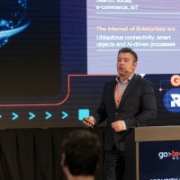

Elastic Security and Wazuh compete in the security solutions category, focusing on features like threat intelligence, SIEM capabilities, and compliance monitoring. Elastic Security has an advantage due to its advanced intelligence system, more detailed documentation, and faster return on investment.
Features: Elastic Security provides advanced Elasticsearch Indexing and Kibana's visualization tools. It is highly scalable and speedy, with an excellent intelligence system for correlating information. Being open-source, it is accessible and customizable. Wazuh offers strong SIEM capabilities, compliance monitoring, and is also open-source. It integrates well and efficiently handles smaller setups.
Room for Improvement: Elastic Security could improve in authentication handling, dashboard development, and setup complexities. Enhanced automation and AI functionalities are also desired. Wazuh users cite the need for native threat intelligence and better scalability in the on-prem version as areas needing attention.
Ease of Deployment and Customer Service: Elastic Security supports various deployment environments, although it can be complex to deploy. Community support is robust but premium support is lacking. Wazuh, open-source as well, is flexible in deployment but may face challenges scaling up in larger environments. Both benefit from strong community support despite occasional issues with premium support responsiveness.
Pricing and ROI: Elastic Security is cost-effective due to its open-source nature, offering quick ROI with lower security costs. However, premium support fees may be high. Wazuh is free to use, but the associated implementation and support costs need consideration. It's suitable for smaller organizations aiming to minimize expenses, though savings are not as significant as with Elastic Security.
It does not require hefty security budgets and can be deployed for enterprise security effectively.
I have seen value in security cost savings with Wazuh, as using proprietary EDR versions could save us substantial money.
Support is prompt and helpful.
Most of the time when my team encounters issues, they receive responses within 24 hours.
I have not faced any difficulties with Elastic Security, as we have a pretty good support service from them.
They responded quickly, which was crucial as I was on a time constraint.
We use the open-source version of Wazuh, which does not provide paid support.
The documentation is good and provides clear instructions, though it's targeted at those with technical backgrounds.
It allows us to think about specific use cases, such as gathering malicious IPs in a single view and analyzing threats based on geolocation.
Elastic Security is quite scalable.
It can accommodate thousands of endpoints on one instance, and multiple instances can run for different clients.
Currently, I don't see any limitations in terms of scalability as Wazuh can still connect many endpoints.
Scalability depends on the configuration and the infrastructure resources like compute and memory we allocate.
In terms of stability, I would rate Elastic a solid eight out of ten.
The stability of Wazuh is strong, with no issues stemming from the solution itself.
The stability of Wazuh is largely dependent on maintenance.
The indexer frequently times out, requiring system restarts.
CrowdStrike and Defender have more established threat intelligence integration due to having a larger client base.
My security testing team continuously reports vulnerabilities, and we have to fix and update the versions frequently.
Machine learning algorithms become better with time; as they ingest a huge volume of data, they become better.
Machine learning is needed along with understanding user behavior and behavioral patterns.
The integration modules are insufficiently developed, necessitating the creation of custom integration solutions using tools like Logstash and PubSub.
I think Wazuh should improve by introducing AI functionalities, as it would be beneficial to see AI incorporated in the threat hunting and detection functionalities.
The pricing is reasonable, especially for Small Medium Enterprises (SMEs), making it a viable option for businesses building their security infrastructure.
This is beneficial for SMEs as they do not need extensive budgets for security solutions.
Elastic Security is considered cost-effective, especially at lower EPS levels.
Wazuh is completely free of charge.
I would definitely recommend Wazuh, especially considering Fortinet's licensing model which is confusing and overpriced in my opinion.
Totaling around two lakh Indian rupees per month.
Elastic Security offers good insight regarding alerts, reports, and cases.
Elastic Security offers advanced features such as machine learning and integration with ChatGPT.
We require rapid processing speed for alerts and event data, and Elastic Security is very efficient at handling this level of data.
Wazuh is a SIEM tool that is highly customizable and versatile.
The system allows us to monitor endpoints effectively and collect security data that can be utilized across other platforms such as SOAR.
With this open source tool, organizations can establish their own customized setup.
| Product | Market Share (%) |
|---|---|
| Wazuh | 7.3% |
| Elastic Security | 4.1% |
| Other | 88.6% |

| Company Size | Count |
|---|---|
| Small Business | 40 |
| Midsize Enterprise | 11 |
| Large Enterprise | 15 |
| Company Size | Count |
|---|---|
| Small Business | 27 |
| Midsize Enterprise | 15 |
| Large Enterprise | 8 |
Elastic Security combines the features of a security information and event management (SIEM) system with endpoint protection, allowing organizations to detect, investigate, and respond to threats in real time. This unified approach helps reduce complexity and improve the efficiency of security operations.
Additional offerings and benefits:
Finally, Elastic Security benefits from a global community of users who contribute to its threat intelligence, helping to enhance its detection capabilities. This collaborative approach ensures that the solution remains on the cutting edge of cybersecurity, with up-to-date information on the latest threats and vulnerabilities.
Wazuh offers an open-source platform designed for seamless integration into diverse environments, making it ideal for enhancing security infrastructure. Its features include log monitoring, compliance support, and real-time threat detection, providing effective cybersecurity management.
Wazuh stands out for its ability to integrate easily with Kubernetes, cloud-native infrastructures, and various SIEM platforms like ELK. It features robust MITRE ATT&CK correlation, comprehensive log monitoring capabilities, and detailed reporting dashboards. Users benefit from its file integrity monitoring and endpoint detection and response (EDR) capabilities, which streamline compliance and vulnerability assessments. While appreciated for its customization and easy deployment, room for improvement exists in scalability, particularly in the free version, and in areas such as threat intelligence integration, cloud integration, and container security. The platform is acknowledged for its strong documentation and technical support.
What are the key features of Wazuh?In industries like finance, healthcare, and technology, Wazuh is utilized for its capabilities in log aggregation, threat detection, and vulnerability management. Companies often implement its features to ensure compliance with stringent regulations and to enhance security practices across cloud environments. By leveraging its integration capabilities, organizations can achieve unified security management, ensuring comprehensive protection of their digital assets.
We monitor all Security Information and Event Management (SIEM) reviews to prevent fraudulent reviews and keep review quality high. We do not post reviews by company employees or direct competitors. We validate each review for authenticity via cross-reference with LinkedIn, and personal follow-up with the reviewer when necessary.